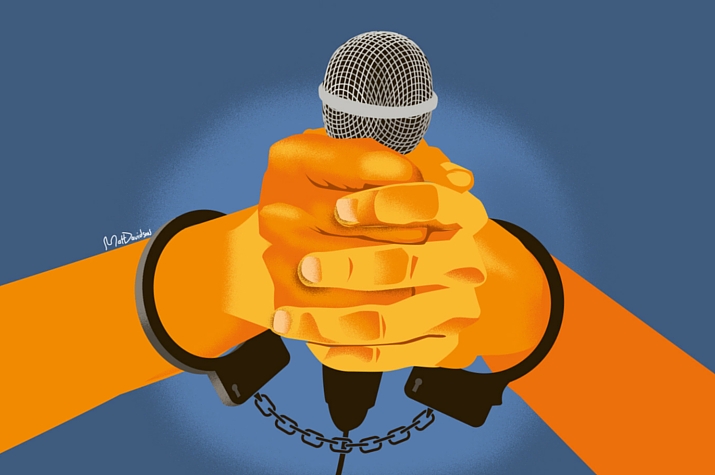Criminalising the Truth, Suppressing the Right to Know

The Foreword to MEAA's report into press freedom in Australia. The full report can be viewed online or downloaded.
“Journalism is not a crime” goes the campaign slogan. It’s a message that is so obvious it should be redundant. But with nearly 200 journalists imprisoned around the world in 2015 and another 109 slain in targeted killings, bomb attacks or cross-fire incidents , the message clearly is being ignored.
In fact in Australia, our Parliament has ruled that journalism is a crime. In recent years it has passed laws that can imprison journalists for up to 10 years for simply doing their job.
New national security laws have focussed not only on fighting terrorism but also silencing voices, punishing truth-tellers, suppressing the public’s right to know and criminalising journalism.
Government has been so determined to inoculate itself from embarrassment that it has developed a battery of laws to punish and imprison those who expose the truth, whether they are whistleblowers or journalists.
We have already had years of refusal by the current government to be open about its activities relating to asylum seekers. Requests for information are met with a blanket refusal to discuss “on-water matters”. Similarly, questions about what happens in asylum seeker detention centres have been met with silence, obfuscation, and even buck-passing questions to foreign governments. Last year this approach was reinforced by brutal legislation: the Border Force Act now carries a two year jail term if “entrusted personnel” disclose “protected” information.
Despite the threats, courageous whistleblowers still get the truth out. But because the government has sought to shroud its asylum seeker policy in secrecy and deny the public's right to know, any news report relying on a confidential source can generate a request to the Australian Federal Police to investigate the leak and prosecute the leaker under section 70 of the Crimes Act which criminalises the “unauthorised disclosure” of information by a Commonwealth officer or a person performing services on behalf of the commonwealth. Section 70 has been problematic for years and the Australian Law Reform Commission has called for it to be repealed and replaced.
As we learnt in April this year with the release of information about the AFP’s access to the telecommunications data of Guardian Australia journalist Paul Farrell, the AFP trawled through his email records and carried out “subscriber checks” to discover everyone Farrell contacted. Such a process not only seeks to identify the confidential source in question but also threatens to compromise every one of the journalist's sources. The AFP created a 200-page dossier, consisting of 51 documents and more than 800 electronic updates. And yet, the AFP says its investigations “are not about targeting journalists”.
More insidious is that some of the leaks recently referred to the AFP for investigation have likely been made by politicians or their staffers. This is particularly true of recent leaks of Cabinet documents and draft Defence White Paper.
In order to further persecute and prosecute whistleblowers, the government has now equipped itself with the two-year mandatory metadata retention laws, and the Journalist Information Warrants that accompany them. Journalists' telecommunications data can be secretly accessed by 21 government agencies.
All this because government is embarrassed: not because a news story is wrong but because it’s true and everyone knows it. So press freedom and the public’s right to know are being trampled on in a mockery of open and transparent government.
Journalists have an ethical obligation to never reveal the identity of a confidential source so the new warrants simply circumvent that and trawl through journalists’ data anyway. Because it’s done secretly, punishable by a two-year jail term if that ever becomes public, there is no opportunity for the journalist or their media organisation to protect the information from the eyes of public servants hunting an alleged source. And the only individuals who might stand up for the public interest are former judges … appointed by the prime minister.
Meanwhile, moves continue to suppress information. Responding to the Home Insulation Program disaster of 2009, senior public servants are now openly seeking to lock-up their deliberative advice, and put it out of the reach. Answering journalists’ requests for information has become too burdensome they say, the Act is “pernicious”, and prudent “risk management” demands that the safest path is to suppress information from prying eyes.
The greatest shame in Australia’s declining standards of press freedom is impunity that surrounds the murder of our colleagues Juanita Nielsen, The Balibo Five and Roger East — all 40 years ago. Add to them Tony Joyce (1980) and Paul Moran (2003). Nine journalists whose killers are literally getting away with murder because of a lack of political will, inadequate or non-existent investigations and mealy-mouthed excuses.
In just a few short years, Australia has fallen from being a bastion of press freedom to a country that has passed a raft of national security laws that allow government agencies to pursue journalists and their sources and criminalises legitimate journalism in the public interest. Increasingly, governments are denying the public’s right to know and moves are underway to deny information from becoming public.
There is a great deal of effort being expended by government to avoid scrutiny. And it’s getting worse. These attacks undermine democracy and, once started, it is very hard to turn back the tide.
Paul Murphy
CEO
MEAA
*Criminalising the Truth, Suppressing the Right to Know - the report into the state of press freedom in Australia in 2016 can be read online or downloaded.